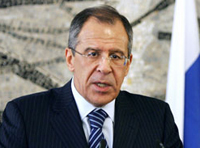Containing Russia: Back to the Future? (Part I)
Influential political forces on both sides of the Atlantic appear intent on starting a debate about whether or not to "contain" Russia. The mere posing of the question suggests that for some almost nothing has changed since the Cold War.

What is a return to containment meant to achieve at a time when Russia has abandoned ideology and imperial aspirations in favor of pragmatism and common sense? What is the purpose of containing a country that is successfully developing and thereby naturally strengthening its international position? What is the point of containing a country that aspires to things as basic as international trade?
It should be no surprise that Russia today is making use of its natural competitive advantages. It is also investing in its human resources, encouraging innovation, integrating into the global economy, and modernizing its legislation. Russia wants international stability to underpin its own development. Accordingly, it is working toward the establishment of a freer and more democratic international order.
The new advocacy of containment may stem from a substantial gap between Russian and U.S. aspirations. U.S. diplomacy seeks to transform what Washington considers "nondemocratic" govern-ments around the world, reordering entire regions in the process. Russia, with its experience with revolution and extremism, cannot subscribe to any such ideologically driven project, especially one that comes from abroad. The Cold War represented a step away from the Westphalian standard of state sovereignty, which placed values beyond the scope of intergovernmental relations. A return to Cold War theories such as containment will only lead to confrontation.
In contrast to the Soviet Union, Russia is an open country that does not erect walls, either physical or political. On the contrary, Russia calls for the removal of visa barriers and other artificial hurdles in international relations. It espouses democracy and market economics as the right bases for social and political order and economic life.
Although Russia has a long way to go, it has chosen a path of development that entails unprecedented, and at times painful, changes. Russian society has reached a broad consensus that these changes should be evolutionary and free of upheavals. Ultimately, a mature democracy, with a vibrant civil society and a well-structured party system, will emerge from a higher level of social and economic development. This requires a substantial middle class, which cannot come into being overnight. It was only Russian tycoons who emerged overnight in the early 1990s – and those times are definitely over.
Frictional Energy
Countries dependent on external sources of energy criticize Russia for assuming its naturally large role in the global energy sector. However, those countries should recognize that energy dependence is reciprocal, since hoarding is not a wise choice for an energy exporting country. That is why Russia has never failed to fulfill any of its hydrocarbon-supply contractswith importing countries. Russia does, however, consider energy to be a strategic sector that helps safeguard independence in its foreign relations. This is understandable given the negative external reactions to Russia's strengthened economy and enlarged role in international affairs, in which Russia lawfully employs its newly gained freedom of action and speech. It should not be criticized by those who frown on a stronger Russia.
The Russian government's energy policy reflects a global trend toward state control over natural resources. Ninety percent of the world's proven hydrocarbon reserves are under some form of state control. Such state control of energy resources is offset, however, by the concentration of cutting-edge technology in the hands of private transnational corporations. Thus, there are incentives for cooperation between the parties, with each sharing the same objective of meeting the energy requirements of the world economy.
Russia is pursuing a foreign policy in striking contrast to the ideologically motivated internationalism of the Soviet Union. Today, Russia believes that multilateral diplomacy based on international law should manage regional and global relations. As globalization has extended beyond the West, competition has become truly global – nothing less than a paradigm shift. Competing states must now take into account differing values and development patterns. The challenge is to establish fairness in this complex competitive environment.
The logical approach is for countries to focus on their competitive advantages without imposing their values on others. U.S. attempts to do the latter have weakened the West's competitive position. As Eberhard Sandschneider, director of the Research Institute of the German Society for Foreign Policy, has put it, U.S. policies in recent years have "damaged tremendously the image of the West" in Asia and Africa. He concludes that nothing, or almost nothing, has been done to make Western values attractive to Asian and African populations. Russia can hardly be held responsible for that.
In his speech in Munich earlier this year, Russian President Vladimir Putin stated the obvious when he said that a "unipolar world" had failed to materialize. Recent experience shows as clearly as ever that no state or group of states possesses sufficient resources to impose its will on the world. Hierarchy might seem attractive to some in global affairs, but it is utterly unrealistic. It is one thing to respect American culture and civilization; it is another to embrace Americo-centrism.
The new international system has not one but several leading actors, and their collective leadership is needed to manage global relations. This multipolarity encourages network diplomacy as the best way for states to achieve shared objectives. In this system, the United Nations becomes pivotal, providing through its charter the means for collective discussion and action.
To be continued…
Russian Minister of Foreign Affairs Sergey Lavrov
Subscribe to Pravda.Ru Telegram channel, Facebook, RSS!




